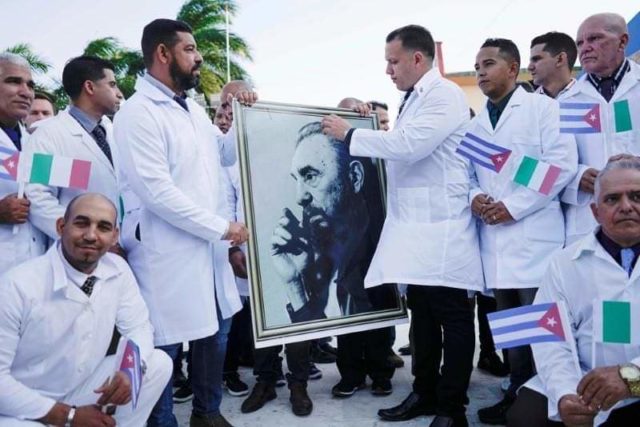“Whoever cannot fight for others will never be sufficiently able to fight for themselves.”
Fidel Castro
Since 1960, socialist Cuba has sent 400,000 doctors and nurses to more than 164 countries to share their medical expertise. Internationalism has been a part of the Cuban Revolution since its earliest days. As far back as 1960, Cuba sent doctors to Valdivia in Chile after an earthquake killed thousands of people.
Cuba’s health system is world-famous for its efficiency. Cuba has more doctors per head of population than any other country in the world, and ranks higher than most “developed” countries on life expectancy and infant mortality. Cuba’s health system concentrates on preventive care, with doctors and nurses living among their patients.
Literally from cradle to grave, Cubans do not pay a cent for health services. This has meant that Cuba’s biggest export, ahead of tourism, is now its thriving biotechnology industry, which has developed lung cancer vaccines and eliminated mother-child HIV transmission. This is all despite the illegal blockade against Cuba.
Cuba has always taken the approach that it is willing to provide assistance to the people of any country, regardless of its relations with their government. Whether it was the right-wing Somoza dictatorship in Nicaragua after the 1972 earthquake or the socialist government in Angola, Cuba has always been prepared to help the people of any country, even when their governments do not reciprocate. After Hurricane Katrina, Cuba even offered assistance to the US government. (It was refused.)
It would take far too long to list every example of Cuba’s internationalist missions. An important example was the mission in Angola, where the MPLA were fighting for liberation against Western-backed mercenaries and apartheid South Africa. Cuba provided not just medical volunteers, teachers and construction workers but also internationalist combatants, more than 2,000 of whom would be killed.
After the Chernobyl incident Cuba took in 26,000 people, the great majority of them children, and gave them free health services, education, and shelter, even after the end of the Soviet Union.
The Latin American School of Medicine trains medical personnel from all over the world, the majority from poor backgrounds, including black Americans, who would not be able to get a medical education in their own country. All the state asks in return is that the qualified doctors go back to their own communities and provide medical care for those who need it, as opposed to who can pay the most.
When Hugo Chávez became president of Venezuela, 70 per cent of the people lacked regular medical care. As part of the health policies of the Bolivarian Revolution, tens of thousands of Cuban health workers poured into the poor barrios of Venezuela. They were nicknamed the “army of white coats.” Of note was Operation Miracle, which allowed blind Venezuelans to travel to Cuba for surgery.
The Cuban medical brigade is named the Henry Reeve Contingent, after an American who fought in Cuba’s first War of Independence against Spain. Their expertise is in working in disaster zones and areas affected by serious epidemics. Since its founding in 2005 they have served in Guatemala, Pakistan, Bolivia, Ecuador, East Timor, Brazil, and other countries, as well as Haïti after the disastrous earthquake in 2010.
Fidel Castro said after the Haïtian earthquake that “we send doctors, not soldiers.” Incidents have since come to light involving disgraceful conduct by American and other UN soldiers sent to Haïti.
Just as it did after the Ebola outbreak in 2014, when it was the first to respond to the World Health Organization’s appeal for medical aid, Cuba has responded to the covid-19 pandemic with absolute selflessness. The image of Cuban medics arriving in Rome will prove more powerful than any propaganda from the United States. The potential of Cuba’s Interferon-2B drug in treating patients only goes to show the inhumanity of the blockade on the world, not just on Cuba.
Cuba’s medical internationalism is the direct product of its Revolution and its socialist ethos. During the Revolution the guerillas built support among the peasants by establishing medical clinics and schools. This has been expanded to the point where Cuba is now in a position to share its resources with the oppressed of the world; and now one in every ten Cubans has served in an internationalist mission. This is an achievement not just for Cuba but for every Marxist-Leninist, an example of what we can achieve when we put our ideology into practice.
The insight of Dr Ernesto Che Guevara, that the most important quality for a revolutionary to possess is the love of humanity, could not be better exemplified than by the Henry Reeve Contingent. It is a reminder that there is a better world, an alternative to the misery and poison of capitalism. Cuban medical graduates swear an oath “to serve the revolution unconditionally wherever we are needed, with the premise that true medicine is not that which cures but that which prevents, whether in an isolated community on our island or in any sister country in the world, where we will always be the standard-bearers of solidarity and internationalism.”






